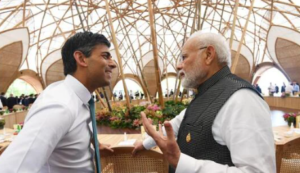
India and the UK are set to unveil a new reciprocal visa arrangement whereby 3,000 degree educated Indian nationals between the ages of 18 and 30 years will be allowed to come to Britain every year to live and work for up to two years.
The UK-India Young Professionals Scheme, which will be reciprocal and open in early 2023, is set to be launched during the first bilateral meeting between Prime Minister Narendra Modi and his British counterpart Rishi Sunak on the margins of the G20 Summit in Bali.
:Hours after Modi-Sunak meeting, UK greenlights 3,000 visas for Indian nationals
The two leaders will “confirm a new bespoke, reciprocal route…to give young professionals from the UK and India a once-in-a-lifetime opportunity to take part in a professional and cultural exchange”, a statement from the UK Prime Minister’s Office said.
India is the first country to benefit from such a scheme, “highlighting the strength of the UK-India Migration and Mobility Partnership agreed last year”, the statement added.
Under the scheme, the UK “will offer 3,000 places annually to 18-30-year-old degree educated Indian nationals to come to the UK to live and work here for up to two years”.
Sunak said, “I know first-hand the incredible value of the deep cultural and historic ties we have with India. I am pleased that even more of India’s brightest young people will now have the opportunity to experience all that life in the UK has to offer – and vice-versa – making our economies and societies richer.”
The British side described the new scheme as part of Sunak’s emphasis on the importance of the Indo-Pacific to global security and prosperity during his bilateral meetings with counterparts on the margins of the G20 Summit on Wednesday.
Sunak and Modi are set to meet later in the day in Bali.
The UK has more links with India than almost any country in the Indo-Pacific and almost a quarter of all international students in Britain are from India, and Indian investment in the UK supports 95,000 jobs, the statement said.
“The Indo-Pacific is increasingly crucial for our security and our prosperity. It is teeming with dynamic and fast-growing economies, and the next decade will be defined by what happens in this region,” Sunak said.
India and the UK are currently negotiating a free trade agreement (FTA), and New Delhi has made the mobility of students and professionals a key part of the discussions. The two sides have already missed a deadline for concluding negotiations by Diwali and are expected to conclude the trade deal next year.
The trade deal will build on the bilateral trading relationship, already worth £24 billion, and “allow the UK to seize the opportunities presented by India’s growing economy”, the statement said.
The British side said in parallel to the mobility partnership with India, it is strengthening its ability to remove immigration offenders. A memorandum of understanding was signed between India and the UK in May 2021 “aimed at increasing mobility between our countries, returning those with no right to be in the UK and India respectively and sharing best practice on organised immigration crime”.
Besides Modi, Sunak will meet Australian President Anthony Albanese, Indonesian President Joko Widodo, US President Joe Biden and Chinese President Xi Jinping.
Sunak will be the first British Prime Minister to meet Xi in almost five years, and he “will be clear on the need for China and the UK, as permanent members of the UN Security Council and major global economies, to establish a frank and constructive relationship”, the statement said.
“The challenges posed by China are systemic and they are long-term. China is a country with fundamentally different values to ours, with an authoritarian leadership intent on reshaping the international order,” it added.
Sunak will encourage China to “use its place on the global stage responsibly to resolve geopolitical tensions, ensure regional stability and play its part in tackling the devastating global impact of the war in Ukraine”. He will also stress that the “pre-condition” for any UK-China engagement will “always be the UK’s national security, including our economic security”.




 Driving Naari Programme launched in Chandigarh
Driving Naari Programme launched in Chandigarh






























